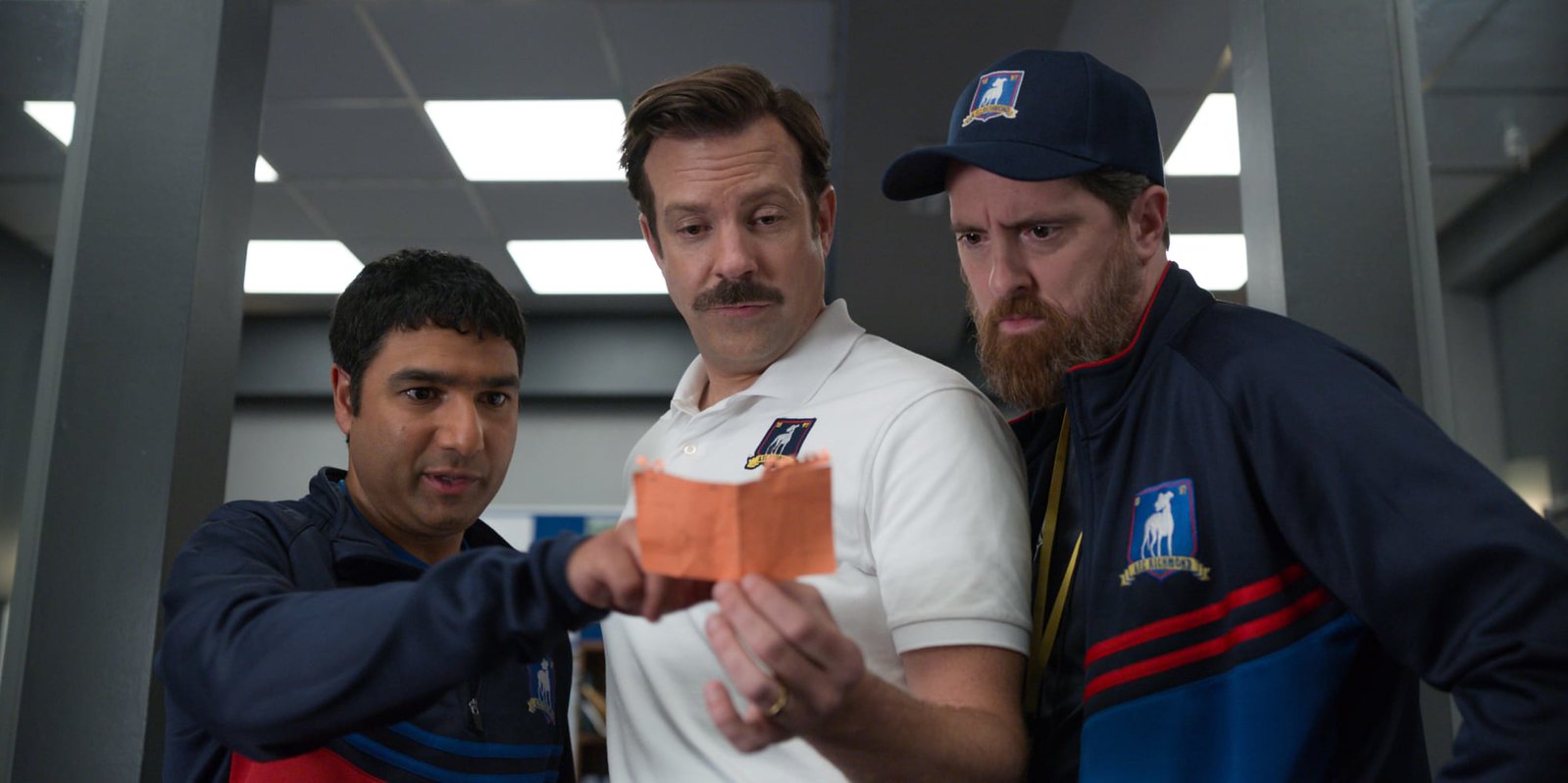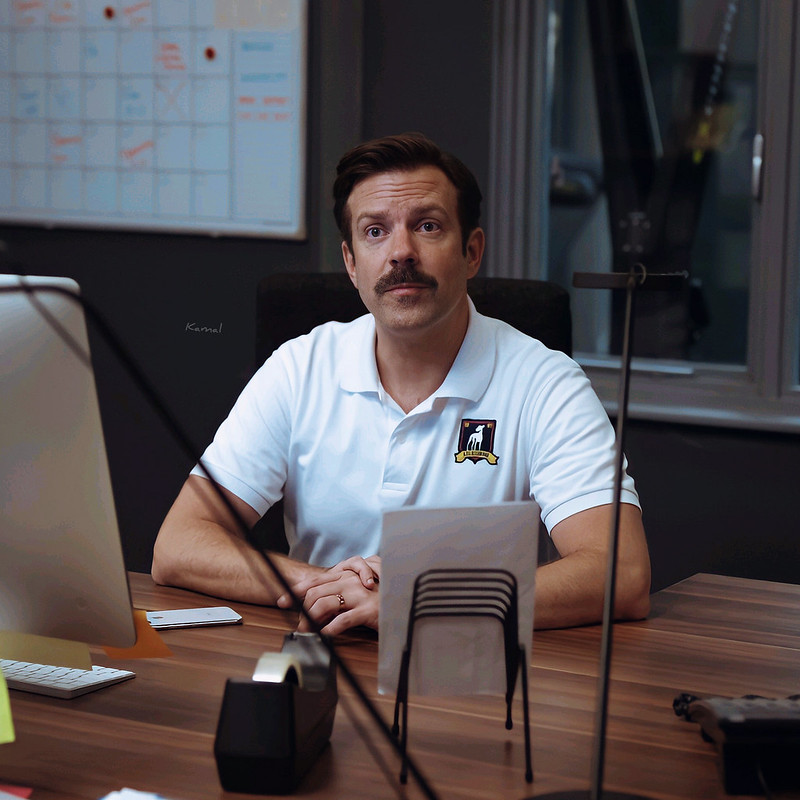Indianapolis, IN. Let’s start with a useful counter-example to the now-popular Ted Lasso. We could do worse here than Friday Night Lights. The book was a “removed,” sociological take by an outsider on a Texas town and its love for high school football. The movie was, well, a cheesy sports movie that didn’t add much to the book. The show, however, actually did something a more interesting than either the book or the movie: it took adolescence, and the kind of consistent guidance needed to shape adolescent energies and possibilities, seriously.
The show Friday Night Lights dove into what it is like to be a teenager trying to establish an identity, sometimes without the cushions of reliable parenting or, much less, material wealth. Within their limits, Tim Riggins, Jason Street, Smash Williams, Julie Taylor, Matt Saracen, Vince Howard, Lila Garrity, Landry Clarke, Tyra Collette, and others confront any number of challenges: the availability and abuse of alcohol, forays into sexual relationship, racial tension and prejudice, the ways a sports injury can derail one’s dreams about how life is going to turn out, quandaries about how to make money, decisions about college, and the deprivation of an important family member who is off fighting a war while his elderly mother deals with dementia, the stress of which ultimately lands on one of those high schoolers.
Pressures to win football games aside, Coach Taylor and his wife, Tammy, become the adults who are willing to see those struggles and to feel their weight on the kids they come to care about. The Taylors have too many of their own problems and flaws to be heroes, exactly, but their many attempts to stay genuinely present during the chaotic rhythms of their community says something important about this life we do not will into existence, but that with a lot of tilling, we can become willing members of anyway.
It is in contrast to a show like Friday Night Lights that the shortcomings of Ted Lasso become apparent. If you’re going to make a show like Ted Lasso, it either has to be so funny (hint, the slapstick humor of its first episode mostly falls short) that I don’t care why an up-and-coming, national-championship-winning, American football coach would sidetrack his life to coach a sport he knows nothing about or you have to work really hard at establishing a compelling situation and characters in which I can become invested. We don’t always have to like characters in a book or on a movie or show, but if they are to achieve enough humanity to move us with any longevity, we will have to glimpse both the fragility of their situation and the depth that goes into the choices they make, some of which will surely make us cringe.
To be fair, some work gets done on this front with Rebecca Welton in the first episode of Ted Lasso. She is the soccer team’s owner. So why would she make such a circus hire? Well, to get back at her cheating ex-husband, who we’re told loved the franchise of which she is now in charge. Okay – a start, and I suspect the series tries to provide more context later on. But still, not exactly rock solid.
We get even less of Ted Lasso’s motivation for the transaction. The final scene of said episode hints at marital discord, and I’m sure the rest of the series plays that up. Regardless, it’s a woefully inadequate answer. Why would trouble in paradise mean leaving the one country in the world that plays and watches a lot of the sport you’re apparently expert at coaching to take on a new culture and a sport you know nothing about? If better answers are offered later, it’s too late. With artistic carelessness, the show’s writers and producers have already missed their opportunity to hook me.
You see, the thing about movies is that they’re usually ninety minutes or so long. Maybe we stomach the cheesy flick out of boredom or maybe we are just giving ourselves an excuse to sit down and tune out after a long week. For multiple seasons and several months, though, I need something that tells us something interesting about who we are. While I think Ted Lasso fails to accomplish this on its own terms, its popularity may inadvertently reveal something about our cultural longings: we want idealism to be sufficient for success.
My own unwillingness to move on to the show’s second episode is clearly not universal; the series has struck some kind of chord, and of course I have friends who are enthusiastic about it. I was talking to one of them recently, and she was trying to convince me to move forward with the series. In my stubbornness, and after we had established that she had also watched both Breaking Bad and Ozark, I asked her to tell me, point-blank, which of those two shows was actually worth watching. Which one was the white bread, and which one full of whole grains? Which one was candy that tasted good and which one fruit right off the vine? She admittedly didn’t want to answer the question according to my chosen framing, but she played along gracefully anyway. She chose correctly: Breaking Bad is a much better show than Ozark.
But how do I know, when I have only watched two episodes of Ozark, whereas I have sat through all of Breaking Bad twice? Well, in Ozark’s opening, I am thrown into absurd scene after absurd scene with almost no attempt whatsoever to answer the very basic question one must answer about that show: why in the world is a middle-class dad, Marty Byrde, actively doing business with the kind of people who show up in the middle of the night and point guns at his head? This is not to suggest that there aren’t people in the world who do these things, who have experiences like this, but they tend to arrive there for specific (and local) reasons. Please don’t misunderstand my point; this is not meant as an ode to realism as a genre. There are narrative works of art on the screen (Lost and The Leftovers both come to mind) that do the kind of work I’m suggesting Ozark and Ted Lasso don’t do.
On paper, there are similarities between the plots of Ozark and Breaking Bad, which is what makes the two worthy of comparison. The difference I’m pointing to, though, is that Breaking Bad does a much better job at establishing Walter White’s why out of the gate. He is a disgruntled (emotional stakes) high school science teacher (expertise) with a recent cancer diagnosis (urgency). He also happens to have a brother-in-law who is an influential cop, and who, for kicks, takes Walt on a ride-along to a meth bust (insight).
Now there are, in my opinion, a couple pieces to the puzzle that are overdone and unnecessary, even on Breaking Bad. It’s a compelling show but not a perfect one.
But it’s worth watching because the show invites viewers to genuinely wrestle with the existential anxiety of being human. Walt is searching for ways to respect himself as a man. Teaching and cancer and not very much money made him feel weak. Violent professional criminals chasing after his product made him feel strong. To make this observation isn’t, in any way, a moral stamp of approval. It is simply an understanding of his motivations, of his humanness.
And this is where I must respectfully depart from fellow Porcher Alex Sosler’s viewing of both Breaking Bad and Ted Lasso. To be fair, Sosler seems to have watched the whole Ted Lasso series, which I am refusing to do. His angle also focuses on Ted Lasso the character as a lens into pastoral leadership, which is a bit different than my interests here. For my purposes, Sosler begins his refeflections with a brief mention of Breaking Bad. Sosler praises Ted Lasso for “(highlighting) goodness,” whereas on shows like Breaking Bad, we “(root) for Walter White…(because) Evil is bad, sure, but it is interesting” (italics his).
Now, it’s true that there are times in Breaking Bad where we find ourselves rooting for Walter, depending especially on how and who he’s clashing with at the moment. Take Hank, for example. Hank is the cop who eventually must face the unenviable truth that his brother-in-law is the violent drug lord that his police force is chasing. Cop who skillfully brings down the bad guy—as well as fun-loving uncle who genuinely seems to care well for his nephew—is good, right? Sure, except we also see enough of Hank to know both his questionable ethics and the ease with which he relies on dehumanizing stereotypes about both criminals and people who have different skin tones than his own. Sometimes good and bad are more complicated than the initially appear to be, and Breaking Bad is an interesting-enough show to depict that.
But we also don’t always cheer for Walter! His lies—so many lies—ultimately crush his marriage, and in many of those scenes any viewer with a conscience sympathizes with Skyler (who, of course, makes a few questionable judgements of her own along the way).
And then there is Walter’s endless verbal abuse and manipulation of his younger business partner, Jesse Pinkman. Pinkman is a total mess for most of the show, though he’s also much younger than Walt, so in some senses, his behavior is more forgivable. Pinkman’s parents have mostly given up on him, and his friends seem to only take from him. Jesse’s success at making and selling drugs is sometimes undone by his need to consume them.
And yet, for my money, if you want to learn about leadership—about the ways mature people can rightly form youthful ideals—from a television show, I’m not going to either Ted Lasso or Walter White. For a polished version, I’ll take Eric and Tammy Taylor, but for the seeds of how one becomes an Eric or a Tammy Taylor, I’ll take Pastor Jesse Pinkman. Pinkman—unlike Walt—seems to have moments of real regret, moments when he is able to recognize himself as his biggest obstacle. One of the show’s most memorable scenes occurs in what is perhaps a church basement. The woman Jesse loves has died of an overdose while lying next to him. In something like a twelve-step meeting, Jesse goes off on a tear-filled back-and-forth with the leader who Jesse perceives is offering cheap grace as The Answer to the group’s many woes.
Leader: “I’m not here to sit in judgement.”
Jesse: “Why not? The thing is, if you just do stuff and nothin’ happens, what’s it all mean? What’s the point? Alright, this whole thing is about self-acceptance?”
Leader: “Kicking the hell out of yourself doesn’t give meaning to anything.”
Jesse: “So I should stop judging and accept?”
Leader: “It’s a start!”
Jesse: “So no matter what I do, hurray for me because I’m a great guy? It’s all good! No matter how many dogs I kill, I just, what, do an inventory and accept? I mean, you backed your truck over your own kid and you, like, accept? What a load of crap!”
Leader: “Jesse, I know you’re in pain…”
Jesse: “No, you know what? Why I’m here in the first place? Is to sell you meth. You’re nothing to me but customers! You okay with that? Huh? You accept?”
Leader: “No.”
Jesse: “About time.”
Jesse then walks out of the meeting, seeming to understand better than most that the path of grief will kill us if it doesn’t provoke us to grow up. We never get the fully-realized Jesse in Breaking Bad—maybe someone will take that subject on in a future show—but he always did seem to show genuine concern and affection for both younger people and romantic partners. Again, unlike Walt, he is able to be honest about the impact his actions can have on other people. Maybe a future version of him—like the Taylors—could become the kind of adult who can be counted on, even during the most difficult times. Virtue can arise from ashes, but it’s a hell of a battle to have our blinders removed enough in the first place to see how our own failures started the fire.
Yet it is this self-awareness, this honest grappling with the limits of our ideals and our failures to embody them, that Ted Lasso brushes over.
So what, then, is the appeal of a show like Ted Lasso? What might its popularity suggest about our culture? I will make some guesses. First, timing matters, and a few months into a global pandemic and policy responses that have, in many ways, further cut us off from each other, I can understand the need for a pick-me-up. I suspect the show—again, if the first episode is any indication of the whole—exploits a tempting-but-ultimately-tragic impulse. We want to believe in “aww, shucks” niceness—the “likeable idiot” in Sosler’s words—as a sufficient posture from which to navigate our lives. To parrot and ad-lib a little Walker Percy, “Bad [television shows] always lie. They lie most of all about the human condition so that one never recognizes oneself, the deepest part of oneself, in a bad [show].”
Second and more profoundly, we want so badly to believe that ideals – hearts “in the right place” – can make up for a lack of competence. But these frames produce Iraq wars and 2008 housing crises. While we’re at, let’s go and admit that if someone who knows nothing about soccer takes over a professional European team that is already mediocre, exactly what Rebecca supposedly wanted would happen: the team would tank, and quickly. No matter how many clever slogans the coach employed or pop psychology workshops he embraced.
Is there an alternative to the Ted Lasso cynicism-versus-optimism dichotomy, an alternative that recognizes human limitations but nonetheless offers hope? I might start with becoming attentive enough to our ignorance, and expectant enough of our own mistakes that we not overshoot the scale of what we’re trying to do. There’s an excellent Wendell Berry essay about that. Or: long and slow commitments to craft. There’s a worthwhile C.S. Lewis speech about that. Or even that man who said, I send you out as sheep in the midst of wolves; so be wise as serpents and innocent as doves.
The problem with Ted Lasso, then, and especially with our attraction to it, is that we want so badly to believe it is sufficient to be as innocent as doves without having to become as cunning as serpents.










12 comments
Shelley M
Apparently you know “the hook”—I never would’ve opened this email to the article if it didn’t tout a take on Ted Lasso I knew I wouldn’t really agree with. I did, however, expect that the person writing would’ve watched the actual show! It’s laughable that over half of this is the merits of Breaking Bad and Friday Night Lights, two shows I didn’t watch so would never think I can contribute two cents to their content, but the discussion of Ted Lasso is shallow and off-base because you didn’t actually watch to see why he’s in England, how things turn out with his family, and what tragic circumstances of Ted’s past result in his quest to be upbeat and kind—even when he has to try very hard. You won’t like the show for its sex and it’s language and the divorce that eventually comes but that’s avoiding what is real in life, even if dramatized here. I get that. But to feel you can actually write an informed opinion piece on it is very bold of you considering you’ve watched one episode. I didn’t love the first one either, or the second to be honest. What I did like that kept me watching was how kindness and attention to others was paramount. Ted learns the names of people in his sphere—from his boss to the guy who takes care of the lawn and laundry to the teenage girl in the street playing soccer. He shows respect and kindness and has relationships in a way I wish I was able to do! I want to do! I aspire to do!! THAT is a Godly thing—not worrying about someone else’s marriage. Hang in there and you see the team transform into a caring “family” who have each other’s backs. It was an acquired taste for me (I know zero and care less than that about soccer) but by episode 4 I was hooked and eagerly awaiting the joy I knew the next episode would bring, as well as the sadness and empathy that comes with learning about new people and what they’ve gone through. Get back to us after season one and THEN I’ll maybe start to think that’s what this article is all about.
Stay safe!
L. X. & R.
Good article, but are you aware that there indeed was a follow up with Jesse Pinkman’s character in the Netflix movie El Camino, immediately following the end of Breaking Bad? Worth watching…
Chris Schumerth
Ha, yes, I did watch El Camino. But what I meant in the piece was more like the middle-aged Jesse. Or something like that.
Rob G
SPOILER ALERT: One of the things that I thought was profound about BB is the way that Gilligan has the moral center of the story slowly pivot from Walter to Jesse. It’s too simplistic to say that as WW gets worse Jesse gets better, but it’s fascinating to watch Jesse’s moral sense slowly awaken while Walter’s spirals downward. The genius of it is that Gilligan pulls it off almost imperceptibly at first. Just brilliant.
Chris Schumerth
Of all the people I know personally who railed me yesterday for writing this piece (ha, maybe I deserved it) you (who I don’t know) are proving to be probably the first person actually willing to try to understand what I was saying. Thank you, Sir! (Obviously I agree with your perception of the Walter/Jesse arcs.)
Rob G
Perhaps the fact that I’ve not yet seen Ted Lasso has something to do with it. I don’t have a horse in the show. 🙂
Chris Schumerth
Thanks to both of you for responding, even if the response was, well, what I would have expected. I would not, however, call this meditation a review. More like a critique of the beginning of a popular television series.
We don’t have unlimited time or energy in this life. Therefore I will continue to be selective about my commitments to shows or books or movies or whatever, like anyone else.
In response to your annoyance that I dare to write about something I haven’t watched all of, allow me to pose a question to you who HAVE apparently watched the 22 episodes:
On the show, why did an up-and-coming, national-championship-winning football coach leave his life to live in another country and coach a sport he knew nothing about? (In addition to: why did said professional soccer team hire such a person?).
Part of my assertion here is that you have to establish that transaction out of the gate, which the show most certainly does not do. However, I’ll admit that because the beginning is kind of lazy, it’s also my prediction that it never answers the question in any way that’s believable or satisfying.
Please prove me wrong (and/or give me a reason to watch the second episode).
Rob G
Unless the first episode of a series is exceedingly bad or offensive I usually will give it two or three episodes to make its case. Sometimes this pays off, sometimes it doesn’t. The Wire is an example of the former, Boardwalk Empire, the latter.
I have a friend who refused to watch BB after he found the first two episodes offensive due to their graphic content. The rest of us advised him that the Tarantino-like qualities of those first couple episodes didn’t continue, and that the show settled into something more serious and less graphic, but to no avail. What’s sad about this is that this fellow is a classics prof who has a very solid grasp of the nature of tragedy, and we all felt that he would have some great insights into the story.
I’m not sure Ted Lasso is my type of show, but I imagine I’ll give it a go at some point or other. For my money the best series of recent years that no one talks about, but should, is the Sundance Channel’s Rectify, which ran from 2013-16. Lots there for Christians to consider, including a surprisingly sympathetic and realistic portrayal of one main character’s strong faith and struggles with doubt. I don’t know if creator/writer Ray McKinnon is a man of faith, but his show certainly “gets” Evangelical Christianity in a way that few if any other productions have. He doesn’t romanticize it, but he’s not condescending either — the spirituality of the characters is taken quite seriously, and some of the scenes into which it figures are simply beautiful and very memorable.
Chris Schumerth
I strongly agree with you that The Wire was a slow start that paid off with some commitment. I wasn’t that big of a fan of the whole first season, but had enough enthusiastic people around me that I trusted, and I loved most of the seasons after that first one.
I think, though, that my criticism here is a bit different than “slow start” (and who knows, maybe I’ll still end up caving to some more Ted Lasso).
I think there is a difference between an underwhelming start and one that refuses to deal with the obvious/essential question(s) that sets up your situation/conceit and protagonist’s development.
Rob G
I liked the first season of The Wire, but I don’t think I was actually hooked until the third episode.
Similarly I have a couple friends who bailed early on Rectify because they didn’t find it “gripping” enough, but I think this was because they are used to watching plot-driven detective shows. Rectify, while having a mystery at the heart of it, is more character-driven.
“there is a difference between an underwhelming start and one that refuses to deal with the obvious/essential question(s) that sets up your situation/conceit and protagonist’s development.”
True — although they can be related, obviously. And in some cases the sheer quality can trump the “I’m not buying it” aspect. I once described a series, I forget which, to a friend as hokum, but very well-done hokum.
Stewart Lundy
If you haven’t seen the second season of Ted Lasso (or a second episode), it’s easy to see how you’re entirely missing the point.
The “hook” is good guy versus bad guy, optimism versus cynicism. But that’s just the appearance.
Ted Lasso is a deeply conflicted character trying to compensate for his losses with blind optimism and it does NOT work for him. But you’d know that if you were reviewing a show that you’d watched. Seriously, try more than one bite before judging.
“Is there an alternative to the Ted Lasso cynicism-versus-optimism dichotomy, an alternative that recognizes human limitations but nonetheless offers hope?”
Yes, there is an alternative: watching the show before prejudging what hasn’t been seen.
Read the book before reviewing the book.
Jonathan
Why is it worth reading analysis of the first episode of a TV show which has (currently) 22 episodes?
Comments are closed.